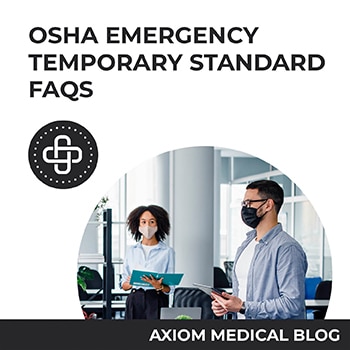In response to the COVID-19 pandemic, the Biden administration has released workplace vaccination and testing mandates for employers with 100 and more employees. With such workplace mandates in place, many employers are already knee-deep, analyzing and adjusting their workplace COVID-19 management programs and protocols to quickly comply with this onerous new regulation once the OSHA ETS is announced. Here is a list of OSHA emergency temporary standard FAQs that every employer may want to know.
UPDATE: The Supreme Court of the United States blocked the workplace vaccine mandates. However, the workplace mandates still apply to essential industries.

OSHA Emergency Temporary Standard FAQS
What are the main requirements of OSHA ETS?
The OSHA ETS or Emergency Temporary Standard requires employers with 100 or more employees to ensure they are fully vaccinated or develop a COVID-19 testing program to test their unvaccinated employees every week.
What are the ETS vaccination requirements?
Employers with 100 or more employees must ensure that their employees are fully vaccinated. Employees must submit proof of vaccination as requested by their employers to comply with the new ETS mandate.
We know that the mandate applies to employers with 100 employees. Is it 100 total employees or 100 per location?
The 100-employees criteria apply to the total number of employees in a company.
Are there any exemptions?
Employees with disabilities and religious beliefs are eligible for an exemption from the workplace vaccination mandate.
What must an employer do to identify, evaluate and correct workplace hazards?
Based on OSHA’s Coronavirus Safework regulations, employers must develop a workplace risk mitigation plan to focus on workforce education and policy implementation in order to identify, evaluate, and correct workplace hazards.
When is an employee considered vaccinated under the ETS?
Under the OSHA ETS, an employee is considered fully vaccinated if the employer has documented the vaccination record stating that he/she received a second dose of the two-dose or a single-dose COVID-19 vaccine at least 14 days prior.
What COVID-19 vaccines are acceptable under the ETS?
All vaccines approved under the Emergency Use Authorization (EAU), or FDA approved are acceptable under the ETS. The ETS also accepts all vaccination listed for EAU by the World Health Organization (WHO) for persons fully vaccinated outside the United States.
Under the new OSHA ETS, does an employer require employees to submit vaccination proof?
Yes, the new ETS requires employers to ensure that their employees are fully vaccinated. To do so, employers may require their employees to submit their vaccination records. Suppose the employee has a disability- or religious creed-related inquiry or medical examination information. In that case, employers may wish to instruct their employees to omit any medical information from such documentation before submission. However, an employer is not obligated to require employees to submit proof of being fully vaccinated.
How long are employers required to maintain documentation of employee vaccination status?
All the vaccination records and data created by the employer under the new ETS need to be maintained for the length of time necessary to establish compliance with the regulation.
What are the testing requirements under the new OSHA ETS?
The new regulation enforces weekly testing requirements for all unvaccinated employees. Employers may offer an onsite testing option or flexible time-off to their employees to take the COVID-19 test during work hours.
The testing obligations are the following:
- Inform all employees of the testing requirements and how they can obtain testing. Employees can get the testing through the employer, local health department, a health plan, or public community testing center.
- Unvaccinated and exposed employees are required to submit their testing results before returning to work.
- When providing testing and handling test-result data, employers must ensure confidentiality and safe data handling.
Does the employer have to provide testing to employees at their work location?
No, employers are not obligated to provide workplace testing options. However, employers may provide or make available testing to employees onsite or at a site separate from their work location.
Does the employer have to pay for the employees’ testing?
Employers may consider offering an onsite testing program to test their unvaccinated employees weekly or compensate their employees if they take the test at an outside location. To implement a testing program, employers may focus on:
- Introducing onsite testing
- Sending at-home testing kits for employees to self-test and report
- Compensate or partner with off-site third-party testing providers
Axiom Medical Can Help!
Does your organization need assistance with Workplace Contagious Illness Management and occupational health services? Axiom Medical can help. With two decades of experience in employee total health program and population health management, we can help your organization with any workplace healthcare needs. Contact us today to learn more!
Contact Us

With a career focused on digital marketing, Chitra is a specialized SEO-Content marketer. After moving from biotechnology to business operations and marketing, Chitra started her digital marketing career as a freelance content developer and technical writer. With Axiom, as a content marketing & SEO specialist, she is passionate about creating informative marketing copies for optimum search engine performance.
Find out more about our Tempo Live Behavioral Health and Injury Case Management services.










